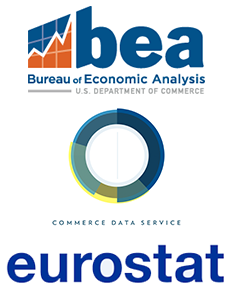
In a show of collaboration between the United States and Europe, BEA is unveiling a new data tool that aims to make it easier to access, compare and visualize economic data between the two regions.
The Bureau of Economic Analysis and the Commerce Data Service, which are both part of the U.S. Commerce Department, have teamed up with Eurostat, the Statistical Office of the European Union, to build this new open-source data tool.
The tool is being built on the statistical programming language called “R” that taps into BEA’s and Eurostat’s huge databases and provides analysts, researchers, economists, data-savvy entrepreneurs and others quick access to economic statistics – requiring only a few lines of code to do so.
GDP, disposable income and employment by industry and by geographic region are among the key economic statistics that will be available as part of the new data tool.
How could this new tool be used? Here are just a couple of examples:
- Economic developers in Europe and the United States could use the data to aid decisions about where to target resources to attract economic development to specific areas. These data also support research related to understanding local economic dynamics and the longer-term impacts of different development strategies.
- Business people and marketers (on both sides of the Atlantic) could analyze the data to make decisions on hiring and investing, such as identifying regions in Europe and the United States to build new plants or facilities or targeting regions to expand operations. These data also could provide a better understanding of the local industrial structure and how growth in a set of industries may affect the composition of the workforce in the area, thus leading to more informed decision making.
Justin Antonipillai, who leads the Commerce Department’s Economics and Statistics Administration with the Delegated Duties of the Under Secretary for Economic Affairs, is highlighting the open-source data partnership between the United States and the European Union while at the Web Summit this week in Lisbon, which bills itself as “Europe’s largest technology marketplace.”